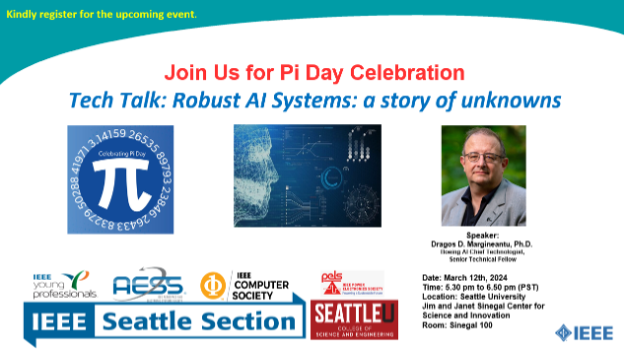IEEE Tech Talk: Robust AI Systems: a story of unknowns
The ultimate goal of AI research is to provide the tools, techniques, and methods for building usable systems that make decisions or assist in making decisions that model and "understand" the world, gather relevant knowledge, and act responsibly. In many cases, the decisions and actions are associated with high risks, and certain assurance or robustness is required from the system that uses AI components. What are the ultimate questions that we need to answer in order to build the required runtime robustness for our systems?
We'll explore the central role that three types of unknowns play in our quest for robustness. These are the unobserved entities that need our research attention to make any assurance guarantees. First, we'll analyze the unknown observations that we need to deal with at runtime. Next, we'll explore the unknown features – the additional dimensions along which we need to reason and that are needed to rely upon at decision time. Finally, we'll discuss the unknown constraints – the unknown functions that we need to optimize against.
Date and Time
Location
Hosts
Registration
-
 Add Event to Calendar
Add Event to Calendar
Loading virtual attendance info...
- Seattle University
- 901 12th Ave, Seattle, WA 98122
- Seattle, Washington
- United States 98122
- Building: Jim and Janet Sinegal Center for Science and Innovation
- Room Number: Room #: Sinegal 100
- Contact Event Hosts
- Co-sponsored by Seattle University Student Chapter
Speakers
Dragos Margineantu, PhD of Boeing
Robust AI Systems: a story of unknowns
Abstract:
The ultimate goal of AI research is to provide the tools, techniques, and methods for building usable systems that make decisions or assist in making decisions that model and "understand" the world, gather relevant knowledge, and act responsibly. In many cases, the decisions and actions are associated with high risks, and certain assurance or robustness is required from the system that uses AI components. What are the ultimate questions that we need to answer in order to build the required runtime robustness for our systems?
We'll explore the central role that three types of unknowns play in our quest for robustness. These are the unobserved entities that need our research attention to make any assurance guarantees. First, we'll analyze the unknown observations that we need to deal with at runtime. Next, we'll explore the unknown features – the additional dimensions along which we need to reason and that are needed to rely upon at decision time. Finally, we'll discuss the unknown constraints – the unknown functions that we need to optimize against.
Biography:
Dragos Margineantu is a Boeing Senior Technical Fellow and AI Chief Technologist who is the technical lead of AI research and engineering at Boeing. His interests include autonomous commercial flight, robust machine learning and decision systems, anomaly detection, modeling & reasoning under uncertainty, validation and testing of learning and decision systems, cost-sensitive, active, ensemble learning, and inverse reinforcement learning.
Dragos Margineantu was one of the pioneers in research on ensemble learning and cost-sensitive learning, and on statistical testing of learned models. At Boeing, he developed machine learning-based solutions for autonomous flight, manufacturing, airplane maintenance, airplane performance, surveillance, and security. Dragos serves and served as the Boeing principal investigator (PI) of multiple DARPA projects and chaired major AI and data science conferences. Dragos serves as the Action Editor for Special Issues for the Machine Learning Journal (MLj), edited by Springer. He co-advised graduate students at MIT and KU Leuven in Belgium, served on Canada Research Chair committees, and on NSF review panels.
In his free time, Dragos is coaching middle schoolers for Mathematics Competitions, and I am a passionate outdoor photographer. Dragos obtained his Ph.D. in Machine Learning in 2001 at Oregon State University, where his thesis advisor was Tom Dietterich.
Agenda
5.30 PM to 6.00 PM Networking and Light Dinner "Pie Day Specials"
6.00 PM to 6.05 Welcome by Seattle Section Chair
6.05 PM to 6.50 PM Techtalk



